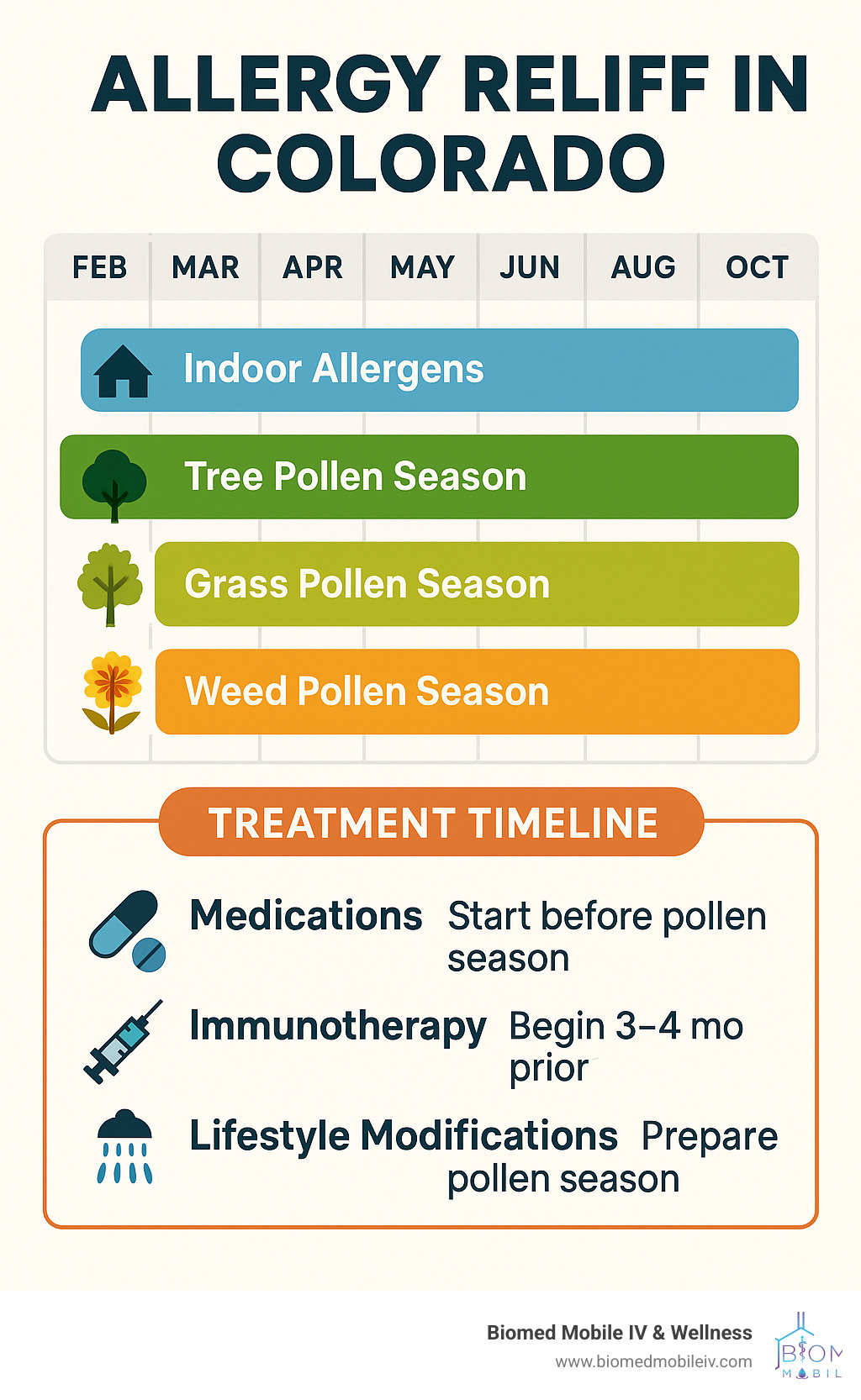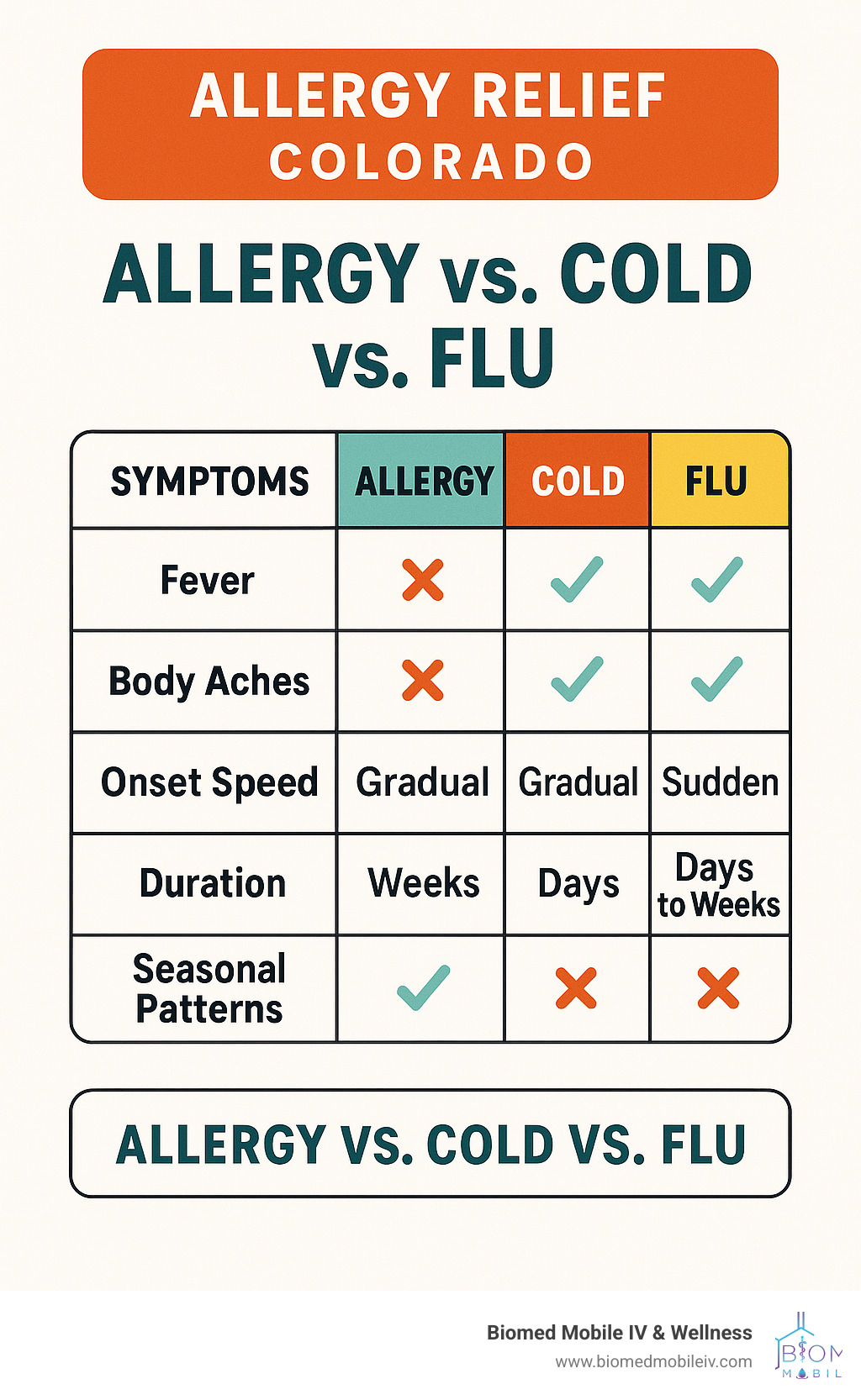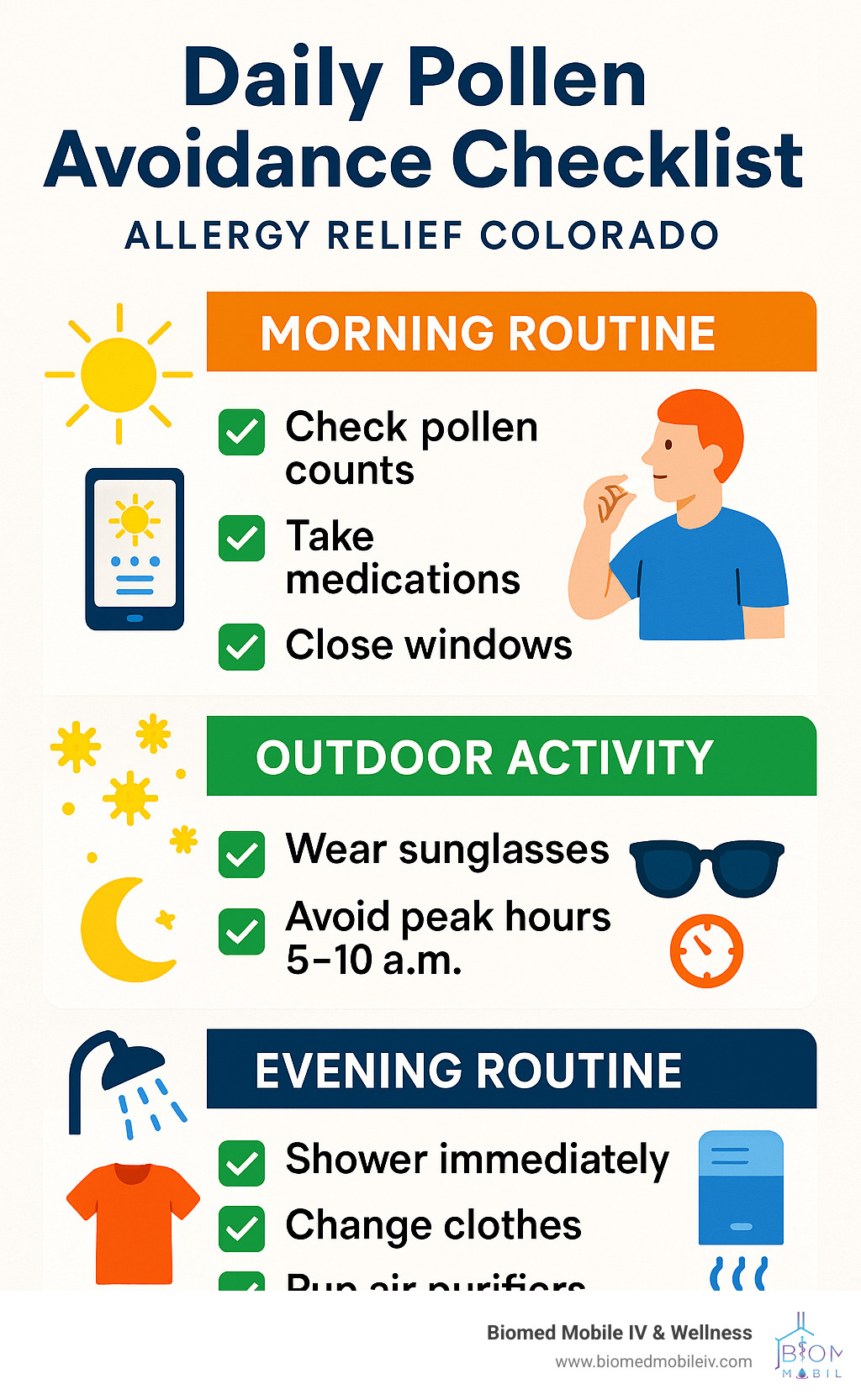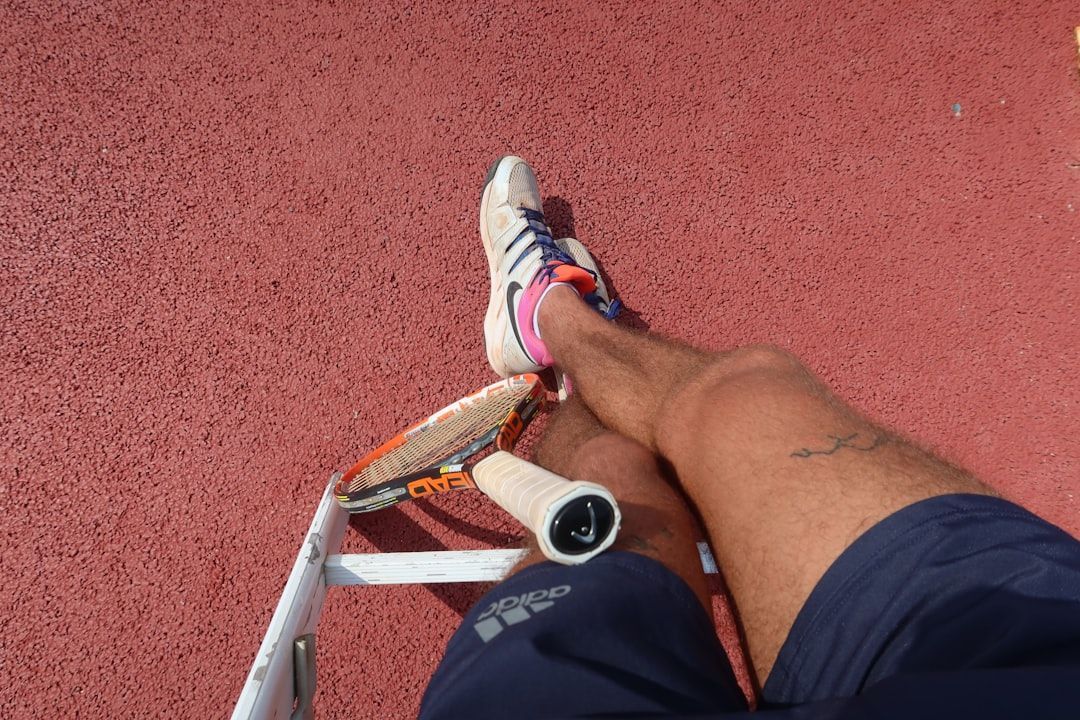The Complete Guide to Allergy Relief Options in Colorado
Why Colorado's Unique Climate Makes Allergy Relief Essential
Allergy relief Colorado residents need goes far beyond typical seasonal remedies. Colorado's distinctive high-altitude environment, extended allergy seasons, and dry climate create unique challenges that affect millions of people living in or visiting the state.
Quick Allergy Relief Options for Colorado Residents:
- Medications: Antihistamines, nasal steroid sprays, decongestants
- Immunotherapy: Allergy shots or sublingual drops (3-5 year commitment)
- Lifestyle Changes: HEPA filters, pollen avoidance, shower after outdoor activities
- Professional Testing: Skin prick tests, blood tests at Colorado allergy clinics
- Advanced Treatments: Biologics like Xolair for severe cases
- Natural Support: IV hydration therapy, vitamin C infusions, quercetin supplements
Colorado's allergy season stretches from late February through the first hard freeze - potentially seven to eight months of symptoms. The state's tree pollen (cottonwood, juniper), grass allergens, and fall ragweed create a triple-threat timeline.
What makes Colorado especially challenging is the combination of high altitude and low humidity. These conditions extend pollen seasons and make indoor allergens like dust mites more problematic during winter months. Denver ranks 91st on the Allergy and Asthma Foundation's list of challenging cities , but the extended season length affects symptom severity.
Climate change impacts are lengthening seasons and increasing pollen production. As one University of Colorado expert noted: "Patients often claim every year is the worst allergy season, and data now support that perception."
I'm Travis Sugg, founder of Biomed Mobile IV & Wellness, and as a paramedic with over a decade of experience serving Colorado communities, I've seen how allergy relief Colorado residents seek often requires a multi-faceted approach that addresses both immediate symptoms and long-term immune support.

Allergy Relief Colorado: Seasonal Triggers & Timeline
When I talk to patients across Colorado about allergy relief Colorado residents need, the first thing that surprises them is how different our allergy season is from everywhere else. Colorado throws us a curveball with what allergy experts call a "triple season" - tree pollen in spring, grass pollen through summer, and weed pollen extending deep into fall.
This extended timeline creates unique challenges. While friends in other states might deal with allergies for two or three months, Coloradans can face symptoms from late February through the first hard freeze - potentially seven to eight months of continuous exposure.
Climate change isn't making things easier either. Scientific research on hay fever shows that higher CO₂ levels cause plants to produce more pollen that's also more potent. Each year, we're seeing longer seasons with higher pollen counts.
Colorado's altitude adds another layer of complexity. Our mountain geography creates wind patterns that carry allergens across vast distances. Plus, our famously dry air keeps pollen airborne longer, extending exposure times throughout each day.
When Does the Season Start & End?
Tree pollen season kicks off with cottonwood and juniper in late February and early March. By mid-March through May, we're dealing with peak tree season featuring aspen, oak, and cedar.
Grass pollen season takes over in June and continues through August. Orchard grass, redtop, and rye grass dominate during Colorado's beautiful summer months - exactly when everyone wants to be outside.
Weed season arrives in August and extends through October. Ragweed peaks in late August and September, affecting the entire state. What's particularly frustrating is that ragweed pollen can travel hundreds of miles, so even high-altitude communities aren't safe.
Winter brings indoor allergens from November through February. While outdoor pollen finally subsides, Colorado's dry climate and increased indoor time create perfect conditions for dust mites, pet dander, and indoor mold growth.
Symptoms of Allergy Relief Colorado Residents Must Track
The symptoms that drive people to seek allergy relief Colorado services often come in waves. Nasal symptoms like runny nose, congestion, sneezing, and postnasal drip are usually the first to appear.
Eye symptoms including itchy, watery, red eyes can be particularly severe in Colorado's dry climate. Respiratory symptoms like coughing, throat irritation, and asthma exacerbation can be serious, especially for people with existing breathing issues.
Systemic symptoms often surprise people the most. Fatigue, headaches, brain fog, and sleep disruption create a cascade effect where poor sleep from congestion leads to exhaustion, which weakens immune function and makes symptoms worse.
Recognizing Symptoms & Differentiating From Colds
One of the most frustrating aspects of seeking allergy relief Colorado residents face is figuring out whether they're dealing with allergies, a cold, or something more serious like COVID-19. This confusion often leads to taking the wrong medications or waiting too long to get proper treatment.
The biggest clue is your temperature - allergies almost never cause fever, while infections usually do. Another key difference is timing and pattern. Allergies tend to hit you the same way every year, often starting around the same dates and lasting for weeks or months. Colds come on more suddenly, peak within a few days, and usually resolve within a week or two.

The quality of your nasal discharge also tells a story. Allergy relief Colorado residents need typically addresses clear, watery discharge that seems endless, while cold symptoms often involve thicker, colored mucus that changes as your body fights the infection.
Common Symptoms for Allergy Relief Colorado Residents
Primary allergy symptoms create a predictable pattern. Sneezing fits- especially those morning episodes where you can't seem to stop - are classic allergy indicators. Your eyes become itchy and watery but without the sticky discharge you'd see with an infection.
Sinus pressure and headaches develop as your nasal passages swell and block normal drainage. Scratchy throat is another common complaint, but unlike strep throat or a cold, it's more annoying than painful.
What catches many people off guard are the cognitive symptoms that come with chronic allergies. Brain fog, forgetfulness, and difficulty concentrating happen because chronic inflammation affects how your brain functions.
Allergy vs. Cold vs. COVID Cheat-Sheet
Allergies create symptoms that persist for weeks or months without fever. Your eyes and nose itch, symptoms worsen with outdoor exposure, and you're not contagious. The nasal discharge stays clear and thin.
Colds typically include low-grade fever and body aches that allergies don't cause. Symptoms last 7-10 days and improve gradually. The nasal discharge becomes thick and colored(yellow or green), and you're contagious for the first few days.
COVID-19 often includes fever and loss of taste or smell- symptoms rarely seen with allergies. Digestive symptoms like nausea or diarrhea can occur, along with severe fatigue that's different from allergy tiredness.
More info about common symptoms and how IV therapy can support recovery from both allergies and illness by providing targeted hydration and immune support when your body needs it most.
Proven Treatment Options: Meds, Shots, Drops & Biologics
When it comes to allergy relief Colorado residents need, we have more effective treatment options than ever before. From tried-and-true antihistamines to cutting-edge biologics, finding the right combination can transform your quality of life during Colorado's extended allergy season.
Over-the-Counter & Prescription Medication Playbook
Second-generation antihistamines are typically where most people start. Medications like loratadine (Claritin), cetirizine (Zyrtec), and fexofenadine (Allegra) are taken once daily and don't cause drowsiness.
Here's the secret: these medications work best when you start them 6-8 weeks before your expected season onset. If you know cottonwood hits you hard every March, start your antihistamine in mid-January.
Nasal steroid sprays are considered the gold standard for nasal congestion. Fluticasone (Flonase), mometasone (Nasonex), and budesonide (Rhinocort) all work by reducing inflammation in your nasal passages. You need to use them consistently for 2-3 weeks before reaching full effectiveness.
Decongestants like pseudoephedrine can provide quick relief when you're desperate. However, they're strictly short-term solutions. Nasal decongestant sprays should never be used for more than 3-5 days, or you'll develop rebound congestion.
Antihistamine eye drops such as ketotifen (Zaditor) and olopatadine (Pataday) can be lifesavers when Colorado's dry air makes your eyes feel like sandpaper.
Immunotherapy in Colorado: Shots vs. SLIT
If medications aren't cutting it, immunotherapy represents the closest thing we have to an actual cure for allergies. Both allergy shots and sublingual immunotherapy (SLIT) work by gradually training your immune system to stop overreacting to harmless substances like pollen.
Allergy shots involve a commitment, but the results can be life-changing. You'll start with weekly injections for 6-12 months, then move to monthly maintenance shots for 3-5 years. Most patients notice improvement within three months, with peak benefits around nine months.
Success rates are impressive - up to 90% of patients see significant improvement, and many experience benefits for 5-10 years or even permanently after completing treatment.
Sublingual immunotherapy (SLIT)- allergy drops or tablets placed under your tongue - offers a more convenient alternative. You can administer these at home daily, and they have fewer side effects than shots. The trade-off is that they're generally less effective than shots.
Advanced Biologics for Severe Cases
Xolair (omalizumab) represents an exciting breakthrough in allergy treatment. This monoclonal antibody is administered monthly and works by blocking the immune system pathway that triggers allergic reactions.
Scientific research on monoclonal antibodies demonstrates how these medications target specific immune pathways, representing the future of personalized allergy medicine.
Supporting your body's natural healing processes can also improve traditional treatments. Many Colorado residents find that IV hydration therapy helps manage allergy symptoms by supporting immune function and reducing inflammation. High-dose vitamin C, glutathione, and B-complex vitamins delivered intravenously can provide faster, more complete absorption than oral supplements.
Lifestyle Hacks & Home Remedies to Minimize Exposure
Environmental control forms the foundation of effective allergy relief Colorado strategies. Simple lifestyle modifications can dramatically reduce allergen exposure and improve quality of life, often providing more relief than medications alone.
Tracking Pollen & Planning Activities
Knowledge is power when it comes to allergy relief Colorado residents need. Pollen.com provides detailed local counts updated two to three times weekly during peak season. When counts are high, it's time to shift into defense mode.
The timing of your outdoor activities makes a huge difference. Evening workouts are your friend because pollen counts typically peak between 5-10 AM when plants release their daily pollen load. Rain is nature's air purifier, washing pollen from the air and giving you a temporary reprieve.
Consider high-altitude escapes during peak valley pollen seasons. While mountain areas aren't pollen-free, they often have different allergen profiles and lower overall counts.
Indoor Allergen Control During Dry Winters
Colorado's dry winters create a perfect storm for indoor allergens. Your HVAC system is either your best friend or worst enemy in the fight for clean indoor air. HEPA-rated filters changed monthly during allergy season can dramatically reduce airborne allergens.
Professional duct cleaning annually removes accumulated allergens that your filters miss. Maintaining humidity levels between 30-50% with whole-house humidifiers prevents dust from becoming airborne while discouraging dust mite growth.
Creating a bedroom sanctuary is crucial. Allergen-proof covers for mattresses and pillows create an impermeable barrier against dust mites. Weekly washing in 130°F+ water kills dust mites and removes allergens from bedding.
Portable HEPA air purifiers running continuously in bedrooms can reduce airborne allergens by up to 90%. Shower and change clothes immediately after outdoor exposure, especially during high pollen days.
Natural Supports & IV Hydration Boosts
Quercetin acts as a natural antihistamine and is found in onions, apples, and berries. Vitamin C supports immune function and has mild antihistamine properties. Omega-3 fatty acids reduce inflammation throughout the body and may decrease allergy severity over time.
Proper hydration is crucial for maintaining healthy mucous membranes and supporting your body's natural detoxification processes. When allergies strike hard, IV hydration therapy can provide rapid relief that goes beyond what oral supplements can achieve.
High-dose vitamin C delivered directly to cells provides maximum absorption and immediate antioxidant support. Glutathione infusions offer powerful antioxidant benefits that help reduce inflammation at the cellular level.
Saline irrigation with neti pots or squeeze bottles provides immediate mechanical relief by flushing allergens from nasal passages. Use distilled or sterile water only to avoid introducing harmful microorganisms. Daily nasal irrigation can reduce symptoms by 25-30% when used consistently.
More info about IV Therapy Wellness and how targeted nutrient support can complement your allergy management plan.

When to Seek Professional Help & Testing Options in Colorado
Knowing when to move beyond self-treatment is crucial for effective allergy relief Colorado residents need. While over-the-counter medications and lifestyle changes help many people, some situations require professional evaluation to identify specific triggers and optimize treatment approaches.
Choosing the Right Test & Clinic
Skin prick tests remain the gold standard for identifying environmental allergens like Colorado's notorious cottonwood, juniper, and ragweed. Results appear within 15-20 minutes as small wheals that indicate positive reactions to specific allergens.
The main advantage is high sensitivity for environmental allergens and immediate results. However, you'll need to stop taking antihistamines 5-7 days before testing, which can be challenging during peak allergy season.
Specific IgE blood tests measure antibody levels to individual allergens and offer convenience when skin testing isn't practical. These tests work well when you can't stop taking antihistamines, have severe eczema, or are dealing with other skin conditions.
At-home testing options have become increasingly sophisticated and offer a convenient starting point for allergy evaluation. Modern CLIA-certified at-home tests use finger-stick blood collection and mail-in analysis for both airborne and food allergens.
Red Flags Requiring an Allergist ASAP
Breathing difficulties during allergy season represent a serious concern. Wheezing, chest tightness, or shortness of breath often indicates allergic asthma, which requires specialized treatment and monitoring.
Chronic sinusitis with recurring infections suggests that allergies are creating ongoing inflammation that interferes with normal sinus drainage. Oral swelling or throat tightness with any exposure represents a medical emergency.
Quality of life issues also warrant professional evaluation. If your symptoms interfere with work performance, disrupt sleep for more than two weeks, or cause mood changes and depression, you deserve better relief than over-the-counter options provide.
Monitoring Progress & Long-Term Management
Successful allergy management requires patience and realistic expectations. Nasal steroid sprays typically require 2-3 weeks of consistent use before reaching full effectiveness, while antihistamines work within hours but may need adjustment.
Immunotherapy represents a longer-term commitment with the most dramatic results. Most patients notice initial improvement within 3 months of starting allergy shots or drops, with peak benefits occurring around 9 months.
Seasonal preparation makes the biggest difference in symptom control. Start medications 6-8 weeks before your expected allergy season begins for maximum effectiveness.
As a paramedic who's seen countless Colorado residents struggle with severe allergy symptoms, I've learned that the most successful patients combine professional medical care with comprehensive support for their overall health. This is where services like mobile IV therapy can play a valuable role in your allergy management plan.
Frequently Asked Questions about Allergy Relief in Colorado
1. Are Colorado's mountains really easier on allergies?
Yes and no. Higher elevations generally have shorter pollen seasons due to delayed spring vegetation and colder temperatures. However, Colorado's unique geography creates wind patterns that can carry pollen across vast distances. Many mountain communities still experience significant tree pollen from aspens and conifers.
The benefit comes from timing - mountain areas may have 2-3 months of lower pollen compared to 7-8 months in lower elevations. However, when you do encounter allergens at altitude, the dry air can make symptoms feel more severe.
2. How soon before season start should I begin medications?
For maximum effectiveness, start medications 6-8 weeks before your expected allergy season begins. This is particularly important for:
- Nasal steroid sprays (need 2-3 weeks to reach full effectiveness)
- Sublingual immunotherapy (requires 8-12 weeks lead time)
- Daily antihistamines (work better when taken consistently)
Since Colorado's season can start as early as late February, many residents benefit from starting medications in January.
3. Do allergy shots or drops work faster in Colorado's dry climate?
Colorado's dry climate may actually improve the effectiveness of both treatments. The low humidity means fewer mold spores and dust mites year-round, allowing immunotherapy to focus on the primary seasonal triggers.
However, the extended allergy season means you need consistent treatment. Allergy shots typically show improvement within 3 months, with peak benefits around 9 months. Sublingual drops may take slightly longer but offer the convenience of home administration.
The key is starting treatment during Colorado's "off-season" (November-February) to build tolerance before the spring onslaught begins.
Conclusion
Managing allergy relief Colorado effectively means embracing the reality that this isn't your typical seasonal challenge. With our state's unique seven-to-eight-month allergy marathon, combined with high altitude and climate change impacts, the old "wait and see" approach simply doesn't work anymore.
The most successful Colorado allergy warriors I've worked with over my decade in emergency medicine all share one thing in common: they treat allergy management like a year-round lifestyle, not a seasonal inconvenience. They start medications 6-8 weeks before symptoms hit, they've invested in quality HEPA filtration systems, and they know their specific triggers through professional testing rather than guessing games.
What makes Colorado particularly challenging is how our extended allergy seasons are intensifying each year. Between longer pollen seasons, higher pollen counts, and more potent allergens due to increased atmospheric CO₂, waiting until you're miserable to take action is like trying to put out a house fire with a garden hose.
The game-changing approach combines traditional medicine with smart environmental controls and targeted support. Long-term immunotherapy offers the closest thing to a cure for severe cases, while natural supports through proper hydration and immune-boosting nutrients can make the difference between struggling through the season and actually enjoying Colorado's incredible outdoor lifestyle.
At Biomed Mobile IV & Wellness, I've seen how the right nutritional support can complement traditional allergy treatments. When clients are dealing with the inflammation and fatigue that comes with months of allergen exposure, targeted IV therapy with high-dose vitamin C, glutathione, and optimal hydration can provide the immune system boost that helps them feel human again.
Our mobile services mean you don't have to choose between managing your allergies and maintaining your busy Colorado lifestyle. Whether you're in Denver dealing with cottonwood season, Boulder facing grass pollen peaks, or anywhere along the Front Range battling fall ragweed, we bring professional nutrient support directly to you.
We serve the entire Colorado Front Range, including Aurora, Berthoud, Boulder, Broomfield, Castle Rock, Centennial, Commerce City, Dacono, Denver, Englewood, Erie, Federal Heights, Firestone, Fort Collins, Frederick, Golden, Greeley, Greenwood Village, Highlands Ranch, Lakewood, Littleton, Longmont, Loveland, Northglenn, Parker, Thornton, Wellington, and Westminster.
More info about Mobile IV Therapy and find how convenient, professional nutrient support can be the missing piece in your comprehensive allergy management strategy.
The bottom line is this: Colorado's allergy seasons don't have to control your quality of life. With the right combination of early medical intervention, smart lifestyle modifications, and supportive care when you need it most, you can spend your time hiking the Rockies, exploring Denver's craft beer scene, or enjoying all the outdoor trips that brought you to Colorado in the first place - instead of being stuck indoors with a box of tissues.






